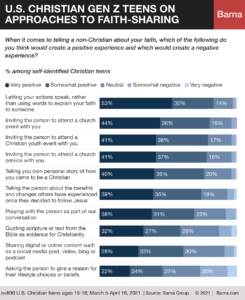Teenage members of Generation Z are much more open to sharing their Christian faith than their Millennial predecessors, but mostly by emphasizing behavior and personal example over traditional approaches to evangelism, new research by the Barna Group shows.
The survey found that 83% of Christian youth ages 13-18 hold either “very positive” or “somewhat positive” views of “letting your actions speak, rather than using words to explain your faith to someone,” Barna reported in the joint project with Alpha USA and Alpha Canada. The new data are reported in an online summary titled “Actions, Invitations, Storytelling — How Gen Z Approaches Evangelism.”
After demonstrating faith by action, today’s teenagers said they are most likely to share their faith by inviting someone to a church (80%) or Christian youth event (79%). Other traditional evangelism techniques trailed from there, with inviting someone to worship at 78%, sharing personal testimony at 76%, discussing the personal benefits of faith at 74%, praying with someone at 69% and quoting Scripture at 59%.
Members of Gen Z, a group born between 1997 and 2015, expressed a lower view of using technology to evangelize.
Surprisingly, Barna also noted that members of Gen Z, a group born between 1997 and 2015, expressed a lower view of using technology to evangelize, with 61% feeling either “very positive” or “somewhat positive” about digital approaches.
The study’s findings are a significant departure from previous research into views about evangelism held by Millennials, the generation born from about 1980 to 1995. “Christian Millennials feel especially conflicted about evangelism — and, in fact, almost half believe it is wrong to share their faith,” Barna reported in a 2019 study it conducted with Alpha USA.
Barna noted in the previous study that Millennials have more opportunities to evangelize than older generations, but also more pressures not to do so.
 “Younger Christians tend to be more personally aware of the cultural temperature around spiritual conversations,” Barna said. “Among practicing Christians, Millennials report an average of four close friends or family members who practice a faith other than Christianity; most of their Boomer parents and grandparents, by comparison, have just one.”
“Younger Christians tend to be more personally aware of the cultural temperature around spiritual conversations,” Barna said. “Among practicing Christians, Millennials report an average of four close friends or family members who practice a faith other than Christianity; most of their Boomer parents and grandparents, by comparison, have just one.”
But they face significant difficulties in broaching the subject of faith. “Sharing the gospel today is made harder than at any time in recent memory by an overall cultural resistance to conversations that highlight people’s differences,” Barna said. “Society today also casts a negative light on proselytization that many older Christians do not fully appreciate.”
As a result, Millennials look with special disfavor on seeking to convert members of other faiths to Christianity, Barna added. “Almost half of Millennials (47%) agree at least somewhat that it is wrong to share one’s personal beliefs with someone of a different faith in hopes that they will one day share the same faith.”
By comparison, only 27% of Gen Xers, 19% of Boomers and 20% of Elders shared that point of view, Barna added.
“Gen Z rarely associates negative emotions with discussions across faith lines,” the researchers found. “This may be because Gen Z is not worried about feeling judged when it comes to conversations on faith. Unlike the Millennials who came before them, these teens accept that not always seeing eye to eye is a fact of life, with over four in five (81%) refuting that ‘if someone disagrees with you, it means they’re judging you.’”
Related articles:
Millennial, Gen Z Christians support missions — with reservations
Experiencing God and engaging in social responsibility are keys to church relevance


